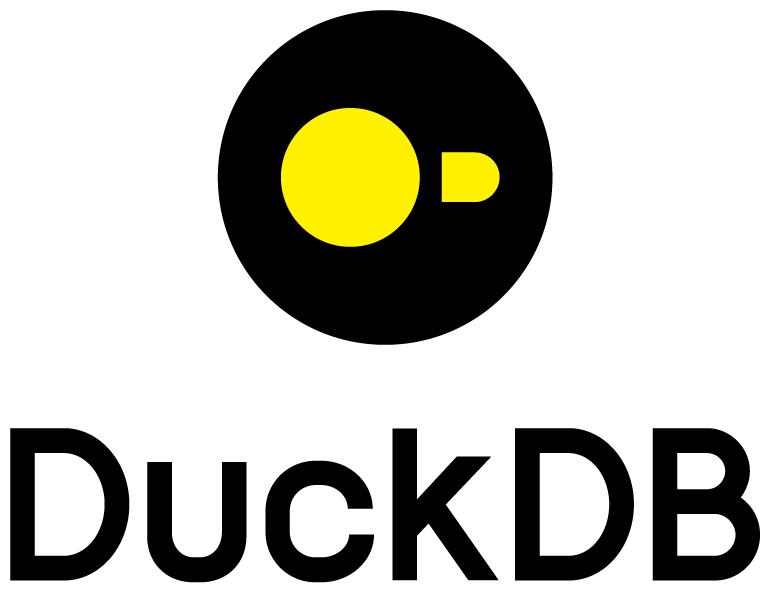- Installation
- Documentation
- Overview
- Connect
- Data Import
- Overview
- CSV Files
- JSON Files
- Multiple Files
- Parquet Files
- Partitioning
- Appender
- INSERT Statements
- Client APIs
- Overview
- C
- Overview
- Startup
- Configuration
- Query
- Data Chunks
- Values
- Types
- Prepared Statements
- Appender
- Table Functions
- Replacement Scans
- API Reference
- C++
- CLI
- Go
- Java
- Julia
- Node.js
- Python
- Overview
- Data Ingestion
- Conversion between DuckDB and Python
- DB API
- Relational API
- Function API
- Types API
- Expression API
- Spark API
- API Reference
- Known Python Issues
- R
- Rust
- Swift
- Wasm
- ADBC
- ODBC
- Configuration
- SQL
- Introduction
- Statements
- Overview
- ALTER TABLE
- ALTER VIEW
- ATTACH/DETACH
- CALL
- CHECKPOINT
- COMMENT ON
- COPY
- CREATE INDEX
- CREATE MACRO
- CREATE SCHEMA
- CREATE SECRET
- CREATE SEQUENCE
- CREATE TABLE
- CREATE VIEW
- CREATE TYPE
- DELETE
- DROP
- EXPORT/IMPORT DATABASE
- INSERT
- PIVOT
- Profiling
- SELECT
- SET/RESET
- Transaction Management
- UNPIVOT
- UPDATE
- USE
- VACUUM
- Query Syntax
- SELECT
- FROM & JOIN
- WHERE
- GROUP BY
- GROUPING SETS
- HAVING
- ORDER BY
- LIMIT
- SAMPLE
- Unnesting
- WITH
- WINDOW
- QUALIFY
- VALUES
- FILTER
- Set Operations
- Prepared Statements
- Data Types
- Overview
- Array
- Bitstring
- Blob
- Boolean
- Date
- Enum
- Interval
- List
- Literal Types
- Map
- NULL Values
- Numeric
- Struct
- Text
- Time
- Timestamp
- Time Zones
- Union
- Typecasting
- Expressions
- Overview
- CASE Statement
- Casting
- Collations
- Comparisons
- IN Operator
- Logical Operators
- Star Expression
- Subqueries
- Functions
- Overview
- Array Functions
- Bitstring Functions
- Blob Functions
- Date Format Functions
- Date Functions
- Date Part Functions
- Enum Functions
- Interval Functions
- Lambda Functions
- Nested Functions
- Numeric Functions
- Pattern Matching
- Regular Expressions
- Text Functions
- Time Functions
- Timestamp Functions
- Timestamp with Time Zone Functions
- Utility Functions
- Aggregate Functions
- Constraints
- Indexes
- Information Schema
- Metadata Functions
- Keywords and Identifiers
- Samples
- Window Functions
- Extensions
- Overview
- Official Extensions
- Working with Extensions
- Versioning of Extensions
- Arrow
- AutoComplete
- AWS
- Azure
- Excel
- Full Text Search
- httpfs (HTTP and S3)
- Iceberg
- ICU
- inet
- jemalloc
- JSON
- MySQL
- PostgreSQL
- Spatial
- SQLite
- Substrait
- TPC-DS
- TPC-H
- VSS
- Guides
- Overview
- Data Viewers
- Database Integration
- File Formats
- Overview
- CSV Import
- CSV Export
- Directly Reading Files
- Excel Import
- Excel Export
- JSON Import
- JSON Export
- Parquet Import
- Parquet Export
- Querying Parquet Files
- Network & Cloud Storage
- Overview
- HTTP Parquet Import
- S3 Parquet Import
- S3 Parquet Export
- S3 Iceberg Import
- S3 Express One
- GCS Import
- Cloudflare R2 Import
- DuckDB over HTTPS/S3
- Meta Queries
- Describe Table
- EXPLAIN: Inspect Query Plans
- EXPLAIN ANALYZE: Profile Queries
- List Tables
- Summarize
- DuckDB Environment
- ODBC
- Performance
- Overview
- Import
- Schema
- Indexing
- Environment
- File Formats
- How to Tune Workloads
- My Workload Is Slow
- Benchmarks
- Python
- Installation
- Executing SQL
- Jupyter Notebooks
- SQL on Pandas
- Import from Pandas
- Export to Pandas
- Import from Numpy
- Export to Numpy
- SQL on Arrow
- Import from Arrow
- Export to Arrow
- Relational API on Pandas
- Multiple Python Threads
- Integration with Ibis
- Integration with Polars
- Using fsspec Filesystems
- SQL Editors
- SQL Features
- Snippets
- Development
- DuckDB Repositories
- Testing
- Overview
- sqllogictest Introduction
- Writing Tests
- Debugging
- Result Verification
- Persistent Testing
- Loops
- Multiple Connections
- Catch
- Profiling
- Release Calendar
- Building
- Benchmark Suite
- Internals
- Sitemap
- Why DuckDB
- Media
- FAQ
- Code of Conduct
- Live Demo
Prerequisites
DuckDB needs CMake and a C++11-compliant compiler (e.g., GCC, Apple-Clang, MSVC). Additionally, we recommend using the Ninja build system, which automatically parallelizes the build process.
Linux Packages
Install the required packages with the package manager of your distribution.
Fedora, CentOS, and Red Hat:
sudo yum install -y git g++ cmake ninja-build openssl-devel
Ubuntu and Debian:
sudo apt-get update && sudo apt-get install -y git g++ cmake ninja-build libssl-dev
Alpine Linux:
apk add g++ git make cmake ninja
macOS
Install Xcode and Homebrew. Then, install the required packages with:
brew install cmake ninja
Windows
Consult the Windows CI workflow for a list of packages used to build DuckDB on Windows.
The DuckDB Python package requires the Microsoft Visual C++ Redistributable package to be built and to run.
Building DuckDB
To build DuckDB we use a Makefile which in turn calls into CMake. We also advise using Ninja as the generator for CMake.
GEN=ninja make
Bestpractice It is not advised to directly call CMake, as the Makefile sets certain variables that are crucial to properly building the package.
About this page
Last modified: 2024-05-17
